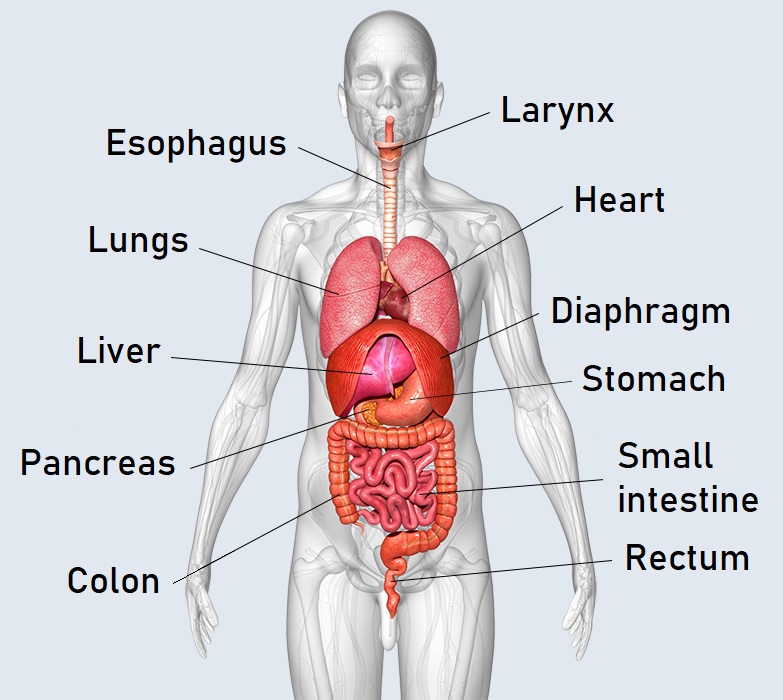Internal medicine
Internal medicine is one of the most diverse fields of medicine, in which prevention is also gaining prominence in addition to treatment. The internist is mainly concerned with pathological changes of the internal organs, the treatment, diagnosis, and prevention of internal medicine diseases. Many specialties are based on internal medicine, which have led to more targeted treatment: for example, cardiology for heart disease, endocrinology for hormone function, gastroenterology for digestive system, haematology for hematopoietic disorders, nephrology for kidney disease, or pulmonology.
The internal physician coordinates these disciplines during treatment. Their role is similar to that of a general practitioner, sometimes they cure only an acute illness, other times they play a caring role for years in the treatment of chronic diseases.
In addition to screening examinations, patients with internal medicine complaints (among others: influenza, cold, headache, abdominal pain, etc.) are examined and treated at the internal medicine department. Other than acute illnesses, the internist also cares for chronic conditions according to professional protocols. Our internal physicians are specialist colleagues with many years of clinical experience who participate in continuous training.

Specialized areas of internal medicine
Due to the comprehensive nature of internal medicine, it has now grown into several specialized disciplines to provide an even more specialized, organ-focused knowledge base for diagnosing and treating diseases. These are the following (the listed specializations require separate examinations, therefore they are not part of the internal medicine examination):
- cardiology for congenital and acquired disorders of the cardiovascular system
- endocrinology dealing with disorders of the endocrine glands, their low or excessive function
- gastroenterology for diseases of the abdominal organs, gastrointestinal system
- haematology for the treatment of diseases of the hematopoietic system
- nephrology for kidney diseases
- lung medicine, or pulmonology.
The internal physician coordinates diagnostic and therapeutic methods in these areas and monitors the results of specialty examinations.
Medicover Start Health Screening Package
The goal of the Start condition screening package is to find the health problem at the very beginning of the development of certain lesions.
With what complaints is it worth visiting an internist?
In addition to general screenings, examinations, and preventive vaccinations, patients with acute and chronic internal medicine complaints can come to be examined. If the following complaints persist, it is recommended to consult an internal medicine specialist:
- abdominal pain, hypogastric cramps
- stomach pain, heartburn
- chest pain
- bloating, constant satiety
- reflux
- intestinal inflammation, intestinal pain
- shortness of breath
- upper and lower airway complaints
- headache, dizziness
- vomiting, constipation, diarrhoea complaints
- loss of appetite
- febrile conditions

Based on the symptoms, the internal medicine specialist may order additional specialist examinations to establish an accurate diagnosis if necessary.
The course of the internal medical examination
The internal medicine examination begins with the recording of the medical history. The specialist will ask the patient about the nature of the complaint, how long it has been present, whether he or she may have any other known illnesses, drug sensitivities, allergies, or whether there has been any cardiovascular, respiratory, or cancerous disease in the family.
This is followed by a physical examination, which includes the measurement of blood pressure, heart rate, body weight, height, and the determination of bodyweight index. The specialist first examines the colour of the skin and the visible mucous membranes, then uses a stethoscope to listen to the heart and lungs, after which they palpate the thyroid and lymph nodes by hand and checks the condition of the abdominal organs (liver, spleen).
Based on the results of the physical examinations, he determines the further course of the examination, the examinations necessary to establish the diagnosis. The internist can also order laboratory tests, ultrasound tests, imaging diagnostic tests, ECG, and other related examinations by a specialist.
It is also worth visiting an internal medicine clinic every one or two years even without a complaint for the purpose of a screening.
What are the most common laboratory tests your internist may request?
Laboratory tests are almost always part of the internal medicine examination. From the results, the internal medicine specialist can get important information about the processes taking place in our body, which helps make a diagnosis.

The internist most often orders tests that show the functioning of the hematopoietic system, liver, kidneys, and fat and carbohydrate metabolism, and the body’s electrolyte balance. The prescribed tests usually include a complete blood count and the determination of iron levels, GOT, GPT, GGT, bilirubin, ALP, CRP values for liver function tests, creatinine, urea, uric acid and urine tests for kidney function, and blood sugar, HDL, LDL, cholesterol level tests showing fat and carbohydrate metabolism function.
The tests above are also available in our clinics in a package for the purpose of general health assessment, which can be used without a specialist’s recommendation.
If symptoms suggest a certain condition, specific laboratory tests may help establish the diagnosis. In case of suspicion of hypothyroidism or hyperthyroidism, the determination of hormone levels TSH, FT3, FT4 is ordered by your internist or endocrinologist, and these tests are also available as part of our complex thyroid laboratory package.
Gastrointestinal complaints may include food intolerance or suspicion of food allergy, lactose intolerance or lactalbumin allergy, diseases caused by gluten, pancreatitis, or inflammatory bowel disease. These diseases can be diagnosed with laboratory tests, the results of which, however, must be evaluated by a specialist in each case.


